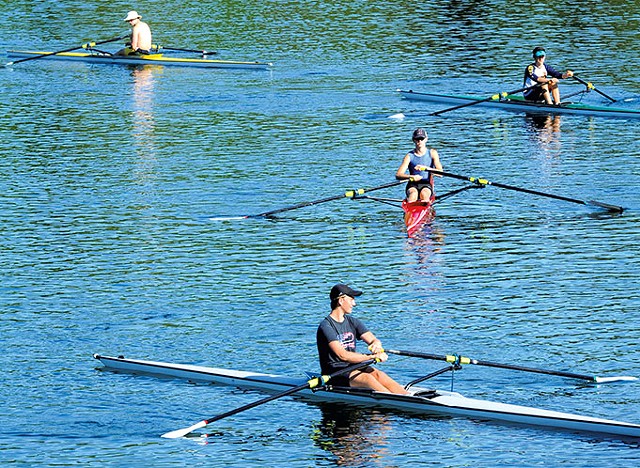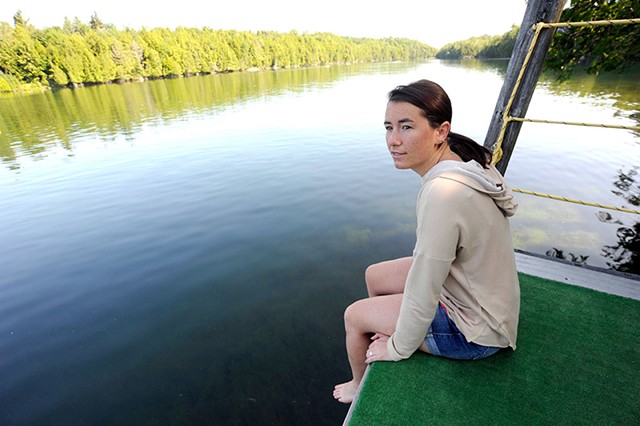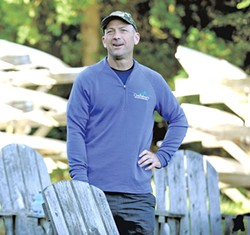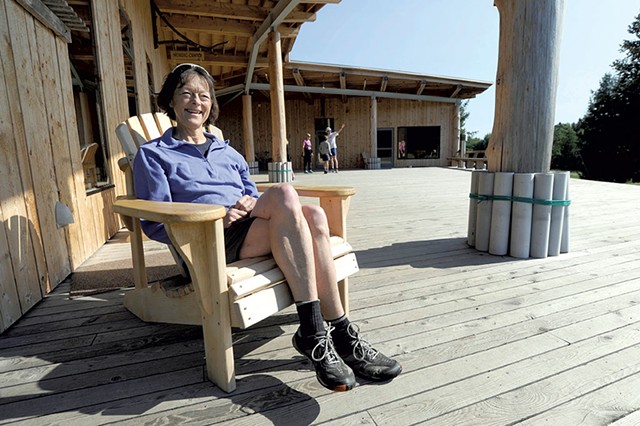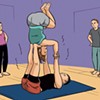Switch to the mobile version of this page.
Vermont's Independent Voice
- News
- Arts+Culture
- Home+Design
- Food
- Cannabis
- Music
- On Screen
- Events
- Jobs
- Obituaries
- Classifieds
- Personals
Browse News
Departments
Browse Arts + Culture
View All
local resources
Browse Food + Drink
View All
Browse Cannabis
View All
-
Business

Cannabis Company Could Lose License for Using…
-
Culture

'Cannasations' Podcaster Kris Brown Aims to 'Humanize'…
-
True 802

A Burlington Cannabis Shop Plans to Host…
-
Business

Judge Tosses Burlington Cannabiz Owner's Lawsuit
-
Health + Fitness

Vermont's Cannabis Nurse Hotline Answers Health Questions…
Browse Music
Browse On Screen
Browse Events
View All
Quick Links
Browse Classifieds
Browse Personals
-

If you're looking for "I Spys," dating or LTRs, this is your scene.
View Profiles
Special Reports
Pubs+More
Water Rights: Scullers vs. Motor Boats in Craftsbury
Published June 29, 2016 at 10:00 a.m. | Updated July 19, 2016 at 8:30 p.m.
Thirty rowing boats embarked from three docks at the southern end of Great Hosmer Pond, then fanned out like dandelion seeds caught in a breeze. The rowers of these sculling shells, as they're called, were students at a weeklong camp hosted by the Craftsbury Outdoor Center. Several others, including this reporter, were there for community rowing, or "comm row," which the center offers area residents at a discounted rate three afternoons a week.
More than a dozen coaches accompanied the student rowers, both on shore and in kayaks and motorized launches. Most were tall, lean, twentysomething men and women with suntanned faces and muscular bodies. Several sported sweats and tees bearing the logos of crew teams from New England prep schools, Ivy League colleges and, in one case, the U.S. Olympic Committee.
The rowing program began shortly after Russell Spring founded the COC in 1976. In 2008, Judy Geer and her husband, Dick Dreissigacker, purchased the company and formed a nonprofit foundation to run it. Since then, the center, and its rowing program in particular, have grown steadily in size and reputation.
Between May and September, the COC now hosts 800 to 1,000 rowers and 45 to 50 visiting coaches from colleges and rowing clubs across North America and Europe. Their ranks include elite, world-class athletes and aspiring Olympians who live and train year-round at the center. Fees for the rowing camps help fund the outdoor center's various community programs and services, including subsidized children's camps, a public gym and fitness center, Nordic ski trails, single-track bike paths, and more.
Overall, the COC has been a boon to this tiny Northeast Kingdom town, which reaps the economic benefits of all those visiting athletes and coaches, including jobs. But some locals don't like its burgeoning use of Great Hosmer Pond, where the rowers have become a source of rancor and divisiveness.
The sheer number of these nonmotorized boats, as well as the incidental noise that can accompany dozens of daily rowing lessons, has caused some neighbors to accuse the outdoor center of monopolizing the lake. At issue is the incompatibility of sculls and other vessels, particularly powerboats. The latter have been used on Hosmer for fishing, waterskiing and tubing since long before the COC existed. Many have expressed concern that they're being muscled aside for a sport that's gaining in popularity, largely among out-of-staters.
Can two competing activities find a way to coexist on the same Vermont lake?
Too 'Great'?
To understand the conflict in Craftsbury requires some background on the geography and history of Great Hosmer Pond, which stretches two miles long but is only 160 feet wide at one point. Ordinarily, state environmental laws wouldn't allow motorized vessels on such a narrow body of water, explained Perry Thomas, lakes and ponds program manager with the Vermont Department of Environmental Conservation. However, because many of the lakefront cabins date back to the 1940s and '50s, she said, the historic use of motorboats was grandfathered in when those laws were enacted.
Even so, Vermont boating laws require motorized vessels to minimize their wake and maintain a distance of at least 200 feet when passing a nonmotorized craft. Because of Great Hosmer Pond's unique shape, that regulation presents a significant — if not insurmountable — challenge for motorboats and sculls occupying the same waters.
"They seem to think that we can coexist out there, and we can't," said Rita Benjamin of Woodbury, referring to the scullers and other lake users. Benjamin and her husband, Don Hawkins, own a waterfront cottage adjacent to the outdoor center that she claims was the first on Great Hosmer Pond; it's been in the Hawkins family since the 1940s. "When they are spread out across the lake and you're trying to tow a skier, you have to stop," Benjamin said of the scullers. "There's just no going around them."
Because scullers row backward and many on the lake are beginners, they don't always see where they're going. She recalled one time when a sculler crashed into the side of a large pontoon boat that wasn't even moving.
"The owner of the pontoon boat leaned over and said sarcastically, 'Oh, I'm sorry! Were we in your way?'" Benjamin recounted with a chuckle. "And the sculler just looked up and said, 'Oh, no, you're all right,' and proceeded to go around."
Troy Howell, managing director of COC's sculling program, has been the primary point person for neighbors with grievances, and he's tried to remain diplomatic while acknowledging the inherent conflict of different lake users. The Oklahoma native and lifelong rowing enthusiast described the situation as "a double-edged sword."
"If there are 40 to 50 scullers and coaches on the lake, it's virtually impossible for anyone to water-ski," Howell said. "By the same token, if there are even three motorboats out there operating at high speeds, it's virtually impossible to scull."
What makes Great Hosmer Pond so desirable to scullers? Howell, who's rowed in 35 states and on three continents, insisted it's not hyperbole when he calls it "the greatest place on Earth to scull, end of story." In an ideal world, he said, the pond would be twice as long. Still, Howell noted, "It almost never gets unrowable," because surrounding hills block the wind, keeping the water's surface calm virtually all summer long.
The pond did become unrowable one day last summer, but not because of wind or waves. After a few decades of détente between the outdoor center and its neighbors, tensions reached a breaking point during the 2015 Labor Day weekend. About a week earlier, the COC had announced that it would hold a sculling camp during the three-day holiday weekend.
When neighbors caught wind of the plan, many were incensed. In protest, scores of them took to the water that weekend in kayaks, canoes, paddleboats, party barges and fishing launches and just hung out. With so many other boats on the water, it was impossible for scullers to row. The COC was forced to cancel its weekend sculling camp and refund its campers.
According to Sarah George, whose parents, aunts and uncles have all owned cabins on Great Hosmer Pond since at least the 1950s, "It was really the first time we stood up for ourselves and for our rights."
From the COC's point of view, "The blockade thing was a creative act of protest, but it was also a little bit alarming," said Howell. When they hadn't seen many boats on the water during previous Labor Day weekends, the center's operators assumed that a sculling camp that weekend wouldn't make waves.
"This turned out to be a fairly large miscalculation on our part," he admitted. Tensions with neighbors were much greater than anyone thought. "Are things escalating?" Howell asked rhetorically. "Well, nobody really knows."
George, whose parents met while summering on Great Hosmer Pond, said that disagreements between neighbors and the COC have ebbed and flowed for years. But only in the last decade, she noted, has the problem become untenable.
"It's always gone on, but as the center grows, the conflict grows," George said. "When there were just a few boats, it was difficult but manageable. Now that there are 40 to 50 of them out there at once, it's nearly impossible."
"I get the sense that it's starting to reach a boiling point," said Lt. Walter Smith, Derby station commander with the Vermont State Police. Although Great Hosmer Pond is a state-owned waterway with a public boat ramp, Smith admitted that police and game wardens have little authority to referee the situation, as scullers and motorboats both have a legal right to be there. Thus far, he hasn't received any reports of vandalism, or worse. But, without taking sides in the dispute, he agreed that the situation now calls for some official resolution.
Water World
A rustic old cabin serves as the main office and reception area for the Craftsbury Outdoor Center. Just outside it, I'm greeted by Geer, 62, a friendly and down-to-earth woman whose smiling, suntanned face is creased in a perpetual squint, as though she's gazing across a shimmering lake.
Geer and Driessigacker might not be household names to most Vermonters, but the couple, and their company, are renowned in the rowing world. Dreissigacker was an Olympic oarsman who competed in the 1972 Summer Games in Munich. In 1976, he and his brother, Pete, founded Concept2, a rowing-equipment manufacturer headquartered in Morrisville. It's no surprise to find that many of the oars and rowing machines on the COC campus bear the Concept2 logo.
Geer, also an Olympian, made the U.S. women's rowing teams in 1976, 1980 and 1984. She and Dreissigacker met through rowing and married in 1985. Both remain deeply passionate about the sport and own a cottage on the north end of Great Hosmer Pond. In summer, they scull nearly every day.
But not between 1 and 4:30, when the COC gets all its boats off the water in deference to other users. Saying the organization took last year's protest "to heart," Geer explained that the COC no longer holds rowing camps on holiday weekends; other weekend camps are now scheduled on alternating weeks.
It's tempting to characterize the Great Hosmer Pond conflict as a clash between "old" and "new" Vermont. But, as Geer pointed out, people have been sculling on the lake since at least the mid-1970s. That's when Russell and Janet Spring, who owned the nearby Windridge Tennis Camp, purchased the grounds of Cutler Academy, a long-defunct boys' prep school, and founded the Craftsbury Outdoor Center.
According to Howell, there's a story — which he acknowledged might be apocryphal — that one winter, rowing legend Jim Joy visited the Russells and skied on the frozen Great Hosmer Pond. Observing its long, narrow corridor and steep shorelines, he suggested it might be ideal for sculling. The outdoor center reportedly launched its rowing program the following spring; it's now in its 41st year.
Geer took me inside the dining hall, another rustic holdover from the property's prep-school days. Decorating the walls are antique snowshoes, black-and-white Cutler Academy photos from the 1960s, and numerous championship plaques from the Canadian Amateur Rowing Association. On a bulletin board near the buffet table is a list of all the local farms the COC supports. In addition to its campers, the center also feeds its 50 to 60 full-time, year-round employees. It is now one of the largest employers in town.
Geer and I grabbed a table with Howell and four athletes in the COC's Green Racing Project. They included Parker Washburn, a 25-year-old native of Andover, Mass., who rowed at Phillips Academy — his father coached there — then later at Harvard. Washburn had just returned the previous night from the Olympic trials in Princeton, N.J., where he competed in a two-man sweep boat.
"We came up a little short," he said, "but it was definitely a great experience and a great year of rowing."
As Howell explained, there are three types of rowers at the center each summer. Every few days, a new rowing camp begins with 25 to 35 participants. These are people who travel from around the country for three to six days of instruction.
"We have a pretty thick wait list of people we are turning away, because we just don't have the ability to run camps that are big enough without completely monopolizing the lake," said Howell, "which some of our neighbors accuse us of anyway."
Additionally, the COC hosts eight athletes, all under age 23, who come for the summer to train for more competitive rowing. Then there are eight rowers admitted to the COC's Green Racing Project. These are elite, year-round resident athletes who train for international competition at the highest levels.
The "green" in Green Racing Project doesn't refer to the Green Mountain State, Geer clarified, but rather to the program's social and environmental mission. When she and Dreissigacker created the nonprofit, they wrote a tripartite mission that includes sustainable stewardship of the lake and land; community inclusion and participation in sports; and the pursuit of athletic excellence, especially in the sports of rowing, Nordic skiing, biathlon and running.
Athletes admitted to the GRP program aren't just chasing their Olympic dreams, Geer noted. They're also community ambassadors of the outdoor center. They help raise animals, tote firewood, weed and water the vegetable gardens on the 500-acre grounds, and teach the community-rowing program.
Some of the athletes even helped design the new net-zero ski lodge and fitness center, which was built two years ago just across the road. It's an impressive facility, constructed mostly from locally harvested timber, that features composting toilets, eight solar trackers and rooftop PV panels that power the center as well as its two electric launches.
In winter, the COC hosts subsidized kids' ski camps; in summer, rowing and running camps. Craftsbury and Albany residents are automatically members of the fitness and ski center, as are students at nearby Sterling College. Others can buy paid memberships, which includes trail passes for the center's mountain-bike and cross-country trails.
"Our mission is all about accessibility and affordability," Geer explained. "Our goal is to keep people fit and create a sense of community at the same time."
Another component of the COC's environmental mission is milfoil control on Great Hosmer Pond. John Brodhead, a longtime ski instructor and COC employee, has worked on controlling the invasive species for more than a decade. Initially, he and others would scuba dive and pull out the aquatic plants by hand, as through weeding a garden. But the milfoil has become so pervasive in recent years that the COC now funds diver-assisted suction harvesting, at a cost of thousands of dollars each year.
"If we don't do it, we'll lose the channel," Geer said, referring to the narrowest section of Great Hosmer Pond. "It's a great concern to us, and it's got to be a great concern to everyone else on the lake."
"If there's anyone doing more conservation on this lake than the outdoor center," Howell added, "I'm completely clueless of it."
Rocking the Boat
The sculling program has become the COC's major income generator — and friction point with neighbors. Despite efforts to "give back to the community," as Geer put it, many on the lake remain unimpressed and point out that the sculling camps are commercial enterprises that harm rather than benefit locals.
"They love to push the fact that they're a 'nonprofit,' but they're charging people to take them out on the lake and teach them how to scull," said Benjamin. "And people like us, who are spending money to be out there, are losing our rights."
Even before last year's Labor Day's protest, the Town of Craftsbury Selectboard tried to intervene and mediate an amicable resolution to the conflict. How successful those efforts were depends upon whom you ask.
Bailey Olmstead of Windsor drives two hours almost every weekend in summer with her husband and two kids to spend time in their cabin just a short distance from the COC boathouse. Like several of her neighbors, Olmstead participated in the mediated discussions with the center.
"We've definitely been trying to find a resolution," Olmstead said. Still, she admitted that she's not sure what an amicable resolution would look like. "I do feel like we've made some strides, but I guess we still feel that [the sculling] is very intrusive to the peaceful setting because there's a lot of hollering and horns," she added. "Being so close to them, we get woken up by them, At times, we just feel very disrespected."
State officials have suggested that perhaps the property owners should form a lake association to establish clear rules about use of the pond. But as neighbor George pointed out, other area residents, including local fishermen who don't own property on Great Hosmer Pond, wouldn't have any say in that process.
"And if we did an association, how would we divvy up votes, because [the outdoor center] owns so much land?" she asked. "Would they have far more say than us and end up hurting us?"
Thomas, at the DEC, suggests that someone should formally petition the state to establish those rules. Geer doesn't think it would be appropriate for the outdoor center to initiate that process. As she put it, "That seems really unneighborly."
Attempts at informal scheduling haven't gone over well, either.
"If we publish a schedule, we get accused of telling people when they can be on the lake," Howell said. "When we don't publish a schedule, we get accused of not caring enough about our neighbors and property owners to tell them what our plans are. We're damned if we do and damned if we don't."
Not everyone on Great Hosmer Pond objects to the scullers. Andrew Tripp has owned property on the lake for four years and built a cabin there two years ago. He calls the sculling controversy "a tempest in a teapot" and suggests that some other homeowners have "a nostalgic fantasy about what the lake once was, that it was their private playground."
Tripp, who bought property in Craftsbury because of its proximity to the outdoor center — he's the Nordic ski coach at U-32 High School in Montpelier — sees the COC as a "massive resource" for the local economy and tax base.
"They're putting people to work and bringing people to the area," he said. "Frankly, I like sitting on my dock and watching world-class rowers go by. It's a lot of fun." Single-seat sculls slice the water with the silent grace of swans — unlike in sweep rowing, during which a coxswain barks "stroke!" to a crew of four or eight oarsmen,
Opponents don't it see that way. In fact, they've suggested that the COC hold all its rowing camps from Monday through Thursday and leave the weekends free for neighbors and other lake users.
For Howell, that's a bridge too far.
"There are people who'd have you believe there are scullers on the water during every daylight hour, every day of the summer. That's demonstrably untrue," he said. "Do you want to be the one to tell our hourly workers that we're going to be cutting their hours?"
For now, an uneasy truce seems to be holding. In the meantime, the COC has said it won't hold rowing camps on the Fourth of July or Labor Day weekends.
To that, Benjamin said skeptically, "We'll see."
The original print version of this article was headlined "Rowing Pains"
Related Locations
-
Craftsbury Outdoor Center
- 535 Lost Nation Rd., Craftsbury Common Northeast Kingdom VT 05827
- 44.67372;-72.37564
-
 802-586-7767
802-586-7767
- www.craftsbury.com
Related Stories
Got something to say?
Send a letter to the editor
and we'll publish your feedback in print!
Tags: Outdoors & Recreation, Craftsbury, Great Hosmer Pond, scullers, row boats, motorboats, boating, rowing, Craftsbury Outdoor Center
More By This Author
About The Author
Ken Picard
Bio:
Ken Picard has been a Seven Days staff writer since 2002. He has won numerous awards for his work, including the Vermont Press Association's 2005 Mavis Doyle award, a general excellence prize for reporters.
Ken Picard has been a Seven Days staff writer since 2002. He has won numerous awards for his work, including the Vermont Press Association's 2005 Mavis Doyle award, a general excellence prize for reporters.
Speaking of...
-

Vermont’s Olympic Rowers Head to Paris
Jul 24, 2024 -

Best cross-country ski area
Aug 2, 2023 -

Wish I Were Here: The Vermont Summer Bucket List
Aug 2, 2023 -

Morrisville's Concept2 Rowing Machines Propel the Action at the World Rowing Indoor Championships
Feb 1, 2023 -

Wintervention: Vermonters Spill Their Secrets to Surviving the Cold Season
Dec 6, 2022 - More »
Comments (12)
Showing 1-10 of 12
Comments are closed.
From 2014-2020, Seven Days allowed readers to comment on all stories posted on our website. While we've appreciated the suggestions and insights, right now Seven Days is prioritizing our core mission — producing high-quality, responsible local journalism — over moderating online debates between readers.
To criticize, correct or praise our reporting, please send us a letter to the editor or send us a tip. We’ll check it out and report the results.
Online comments may return when we have better tech tools for managing them. Thanks for reading.
- 1. Video: Plainfield Recovers From Catastrophic Flood Stuck in Vermont
- 2. Vermont’s Olympic Rowers Head to Paris Outdoors & Recreation
- 3. Vermont's Singular Sculpture on the Highway Project Gets a Facelift Art Review
- 4. Visiting Randolph, Vermont? What to See, Do and Eat on Your Trip Visiting Vemont
- 5. Vermont Comedy Club Chef Mo AlDoukhi Cracks Eggs and Jokes Grilling the Chef
- 6. The Magnificent 7: Must See, Must Do, July 24-30 Magnificent 7
- 7. Theater Review: 'The Prom,' Lost Nation Theater Theater
- 1. Three to Six Hours in Newport, Vermont’s North Coast Culture
- 2. Burlington’s Semipro Soccer Team, Vermont Green FC, Is Winning On and Off the Field Outdoors & Recreation
- 3. Vermont’s Olympic Rowers Head to Paris Outdoors & Recreation
- 4. Québec’s Powwow Season, a Summer Tradition, Kicks Off Québec Guide
- 5. Theater Review: 'The Beauty Queen of Leenane,' Dorset Theatre Festival Theater
- 6. Vermont Playwright and Musician Stephen Goldberg Dies Performing Arts
- 7. State Architectural Historian Devin Colman Steps Down — and Into a New Role Architecture

























